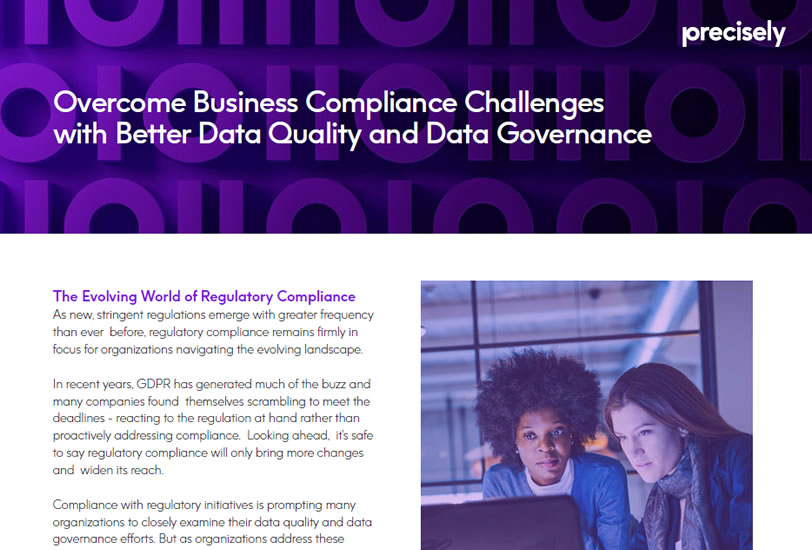White Paper
Overcome Business Compliance Challenges with Better Data Quality and Data Governance
Looking ahead, it’s safe to say regulatory compliance will only bring more changes and widen its reach. See how the intersection of data quality and data governance can help you overcome compliance challenges.
As new, stringent regulations emerge with greater frequency than ever before, assessing data quality on an ongoing basis is necessary for keeping up with the evolving regulatory compliance landscape. Otherwise you’ll be reacting to the regulation at hand rather than proactively addressing compliance.
Compliance with regulatory initiatives is prompting many organizations to closely examine their data quality and data governance efforts. But as organizations address these requirements, they find that the intersection of data quality and data governance offers significant business benefits beyond the compliance focus.
Data governance and data quality tools, along with outputs like data relationship maps and data lineage graphs, are highly complementary for regulatory compliance use cases. Data governance tools provide a broad set of essential capabilities to identify and manage data assets, including enabling non-technical business users to define data policies and associated rules using natural language. However, data governance tools do not:
- support the technical application of rules to your data
- express those rules in a valid technical syntax
- test your data to verify compliance with rules on an ongoing basis
Gaining this vital additional functionality requires advanced data quality analysis and monitoring.
Even as organizations continue to focus on compliance initiatives, they are, at the same time, seeking to get more business value out of their data.
The impact of having correct, clean, complete, and up-to- date information reverberates across business processes. From customer service to marketing to logistics, having accurate information creates efficiency, streamlines operations, and increases effectiveness in all your customer-facing activities.
With clean data, there’s increased trust, which makes a big difference in the willingness to take important actions based on analytics and business intelligence on that data. Sales and marketing efforts also benefit from the improved reach that clean data provides. Whether you’re researching where to host a sales event, target a regional marketing campaign, add a new logistics partner, or select a retail site, accurate and complete information is a solid foundation. Strong data quality also powers new initiatives like machine learning, which can only be fueled by clean, high quality data.
Read this whitepaper and explore how the intersection of data quality and data governance can help you overcome compliance challenges while offering significant business benefits.
